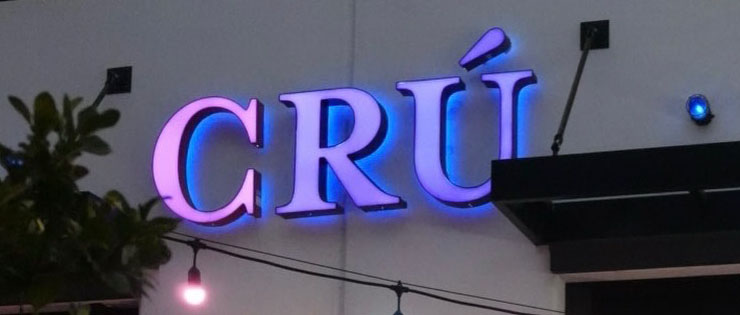CRÚ Food & Wine Bar Eyes National Growth
Finance • 31st Oct, 25

Simon Bozas, cofounder of family office Mezas Capital, could see the potential in CRÚ Food & Wine Bar. That vision turned into an acquisition earlier this year.
His firm is involved in the food and beverage space on college campuses, military bases, casinos, and airports. CRÚ takes a different approach.
The concept has been around for almost 25 years and taken advantage of “A” real estate in Texas-based lifestyle centers, which Bozas describes as areas with retail, office buildings, and multi-family complexes where customers aren’t as congested in a downtown environment. COVID accelerated the proliferation of these suburban centers.
Bozas and his team became attracted to CRÚ because it operates in a segment with a lot of whitespace and no other significant players.
“There’s no real national player if you take a look at it,” says Bozas, who serves as the company’s CFO. “I mean, wine bar. Now there’s a couple of concepts out there that kind of did a restaurant with the wine bar, but nobody’s dominating the space … There’s a shortage of national chain wine bars with ‘A’ plus plus real estate and ‘A’ plus service.”
CRÚ’s ultimate goal is to “demystify the world of wine” and make hundreds of selections accessible to customers. The brand is a pioneer in this regard; it became the first wine bar in Texas to offer 30 wines by the glass and more than 300 bottles from around the world. The chain was founded by Patrick Colombo in 2002.
Even with just 10 locations, the brand has somewhat of a national presence, with stores in Texas, Georgia, North Carolina, and Colorado. The objective, according to Bozas, is to double in size within 48 months. One of the expansion verticals is airports. The chain is in Dallas-Fort Worth International Airport, Denver International Airport, and Dallas Love Field Airport, and Bozas hopes to bump that to five or six airport-based locations through licensing agreements.
There are plans to open stores in Atlanta and Dallas next year and then Greenville, South Carolina, and other markets in 2027.
“So the brand has always been a good single operator, and [Colombo has] done it in multi-states, but not nationalize it,” Bozas says. “We are going to go into all the states and become a national player.”
To prepare for accelerated growth, CRÚ moved its headquarters from Dallas to Plano so it could have more space. Bozas says Colombo had a small team that was “lean and mean.” It worked, but to reach 25 to 30 stores, there needed to be more infrastructure, the executive says. The brand doubled the size of its corporate office staff, so now there’s directors of marketing, culinary, procurement, and IT.
In terms of revamping the brand, Bozas wants to bring in a new wine selection to supplement the current offerings. He calls it “take out the bad and grow the good.” Additionally, CRÚ will offer food to complement wines from around the world, whether that’s Spain, Italy, France, or another region. The experience will be more tapas style versus a full sit-down experience. The brand is in the process of rebranding itself from CRÚ Food & Wine Bar to CRÚ Wine Bar and Bistro to reflect its menu shift.
CRÚ is also looking to market itself to 28 year olds and above.
“We’ve had a good following of customers over the last 20 years, but our customer base on average is a little bit over the milestone that we’re trying to accomplish,” Bozas says.
Currently, stores are typically 1,800 to 2,300 square feet, with the kitchen taking up about 700 to 1,000 square feet. There is a big emphasis on the patio space.
“It’s not like drinking a tequila or a martini where you want to sit inside the bar, get in touch with the bartender, an illuminated bar,” Bozas says. “That’s not the concept of a wine bar. It’s more of a relaxed, take off your shoes kind of environment, outdoor, a little breeze, see a little tree moving. It’s a different kind of experience.”
In terms of restaurant design, CRÚ is working through a couple of prototypes. The chain wants to move forward with future stores that “enhance our design according to the times” to help attract the younger generation. Some units have been around for a couple of decades, and those will receive upgrades as well.
New locations will offer event spaces for private dining experiences and corporate events. The company is already big on rehearsal dinners, and it wants to expand upon its efforts.
“The way we’re doing that is we’re creating programs for executives in order for them to have an experience,” Bozas says. “Today, let’s just say your company has 100 employees and they’re going to take them out to a national chain, and I would say a steakhouse. Well, that’s fine, but the five executives or 10 executives can have a catered high-end, high-quality wine and food experience prior or the next day that is in a smaller venue, more intimate, where the top 5 percent of the company gets to participate in it and we’re creating products specifically for that.”
CRÚ will also improve its efforts around technology. One of IT’s biggest projects is creating an online educational class for employees to ensure they are knowledgeable about the product offerings when talking to guests. Another part is upgrading CRÚ’s POS system.
The third strategy is to create a new e-commerce platform to deliver wine and glassware directly to customers’ homes. To begin, locations will ship wines from their own inventory. As CRÚ grows, it will open a centralized warehouse from which products will be shipped and delivered.
Going forward, Bozas says two factors will differentiate CRÚ in the wine bar category—the experience of Colombo and the brand’s establishment as a legacy concept.
“To be around for 25-plus years, that’s no longer a brand, that’s a staple,” Bozas says. “And that’s the reason why that particular brand caught our attention.”

